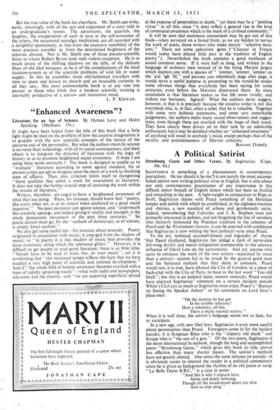"Enhanced Awareness"?
Literature for an Age of Science. By Hyman Levy and Helen Spalding. (Methuen. 15s.) IT might have been hoped from the title of this book that a little light might be shed on the problem of how the creative imagination is to grapple with the new scientific concepts of the nature of the universe and of the personality. But what the authors mean by science is no more than technology, with all its social consequences; and their object is to integrate the dynamic of literature with the logic of history so as to promote heightened social awareness. (I hope I am using these terms correctly.) The book is designed to enable us to "evaluate" literature according to some agreed standard, for at present critics are apt to disagree upon the merit of a work (a shocking state of affairs). Thus, alas, criticism limits itself to rbcognising "those qualities that admit a work for assessment as literature. It does not take the further crucial step of assessing the work within the stream of literature."- Writers, therefore, are urged to have a heightened awareness of what they are doing. Poets, for instance, should know that "poetry, like every other art, is at its richest when anchored to a great social incentive." No poet moreover can ignore science, and "underneath this scientific upsurge, and indeed giving it vitality and strength, is the whole democratic movement of the past three centuries." So poetic diction must go, for the "outlook of democracy, as of science, is simply direct realism." We also get some useful tips—for instance about prosody. Poetry originated in association with music; it emerged limn the shadow of music; so "in poetry it is this shadow of music that provides the basic continuity along which the substance glides." However, it is difficult to get people to read good literature; there is so little time. "Novels have to be read in train, bus, or over meals"; yet it is comforting that "this increased tempo reflects the facts that we have reached a very high point of scientific and rational development." And if "the whole field of human awareness becomes overlaid with a mass of rapidly sprouting weeds"—what with radio and newspapers, television and the cinema—and "we are acquiring superficial spread at the expense of penetration in depth," yet there may be a "positive virtue" in all this, since "it does reflect a general rise in the level of communal awareness which is the mark of a civilised community."
It will be seen that enormous amusement may be got out of this book—when surveyed on a broad front, as we are bidden to survey the work of poets, those writers who make merely "selective incis- ions." There are some aphoristic gems ("Chaucer in French would today have played little pelt in the tradition of English poetry"). Nevertheless the book contains a good modicum of sound common sense. If it were half as long, and written in the language of ordinary men instead of in the tiring Marxist jargon which shatters you with a species of" 'ammer, 'ammer, 'ammer on the 'ard 'igh 'ill," and Pursues you relentlessly page after page, it would serve a useful 'purpose in presenting to the would-be reader some obvious things that everybody has been saying for some centuries, even before the Marxists discovered them. Its main contention is that literature makes us live life more vividly, and widens our horizons. Agreed! What the authors never suggest, however, is that it is precisely because the creative writer is not like everybody else, is, in fact, often a rebel, that he is valuable. Together with some very dubious statements, and some very remarkable judgements, the authors make many sound observations anti sugges- tions, even though these are overlaid with the lingo of their creed. They have clearly been driven on to their task by an admirable enthusiasm; but it may be doubted whether an "enhanced awareness" of anything will result in anybody's mind, except perhaps that of the sterility and pretentiousness of MarxiSt criticism.
BONAMY DOBREE.


































 Previous page
Previous page